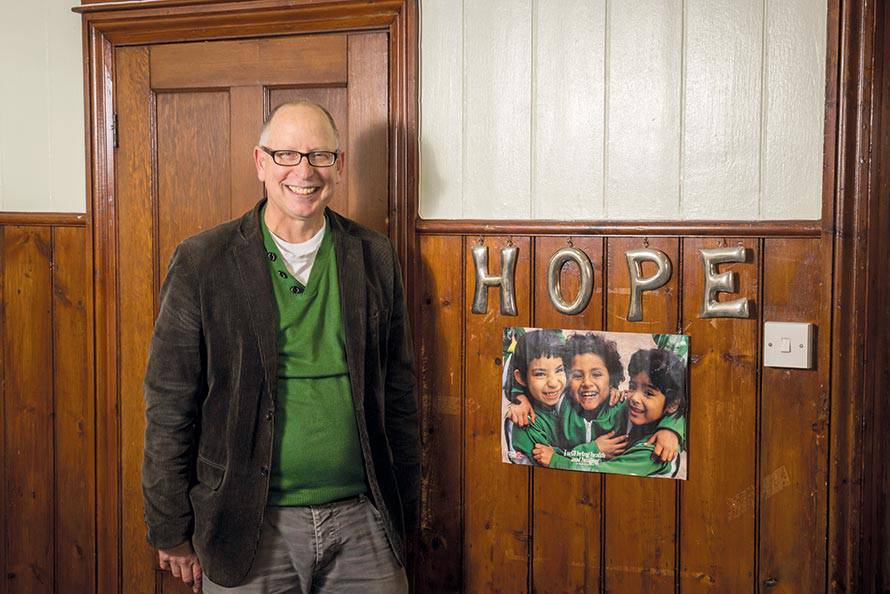Figures from a survey released this month revealed that 100 faith groups in Tunbridge Wells contributed over 15,000 hours of voluntary community service last year.
Groups which took part in the Cinnamon Faith Action Audit included the Tunbridge Wells Street Pastors, the mental health charity Crossways Community and the church-run Winter Shelter.
Other names listed among the 100 churches and organisations included Hospice in the Weald, Beechwood Sacred Heart School, St John’s Church and the Salvation Army.
But with religious faith in decline across the United Kingdom, one minister believes Tunbridge Wells is bucking the trend thanks to the strong community activism of the town’s numerous faith groups.
Cliff Allen, a minister at the Evangelical Church of Christ on Commercial Road and secretary of Churches for Tunbridge Wells, spoke after the survey was released.
Reverend Allen said: “Often the Church is undervalued and unsung, but this survey demonstrates what a positive input faith groups contribute towards the town.”
This positive activism has led to a ‘modest’ reversal in the decline of church attendance, Reverend Allen believes.
He said: “Attendance is very good in Tunbridge Wells. Last year we saw a modest increase in my church, while others are also reporting a pickup in number or are at least holding steady.
“Of course, I would not go so far as to say it is a full blown revival.”
Although he runs one of the smallest churches in the town, the reverend has seen his average congregation climb from the low 30s to around 40 this year.
He said: “Obviously percentage wise that is a big increase for us, even if the actual figure is quite small. But this trend could probably be extrapolated across other churches in the town.”
Other findings revealed each faith group surveyed supports an average of seven projects, while 65 per cent said they ‘work in partnership to achieve the delivery of projects’.
These projects are vital for the wellbeing of the town, Reverend Allen said, adding the town would be ‘poorer’ without them.
He said: “The Street Pastors is an example of our collaboration, with around 25 churches taking part. It is this sort of thing which makes the town unique.
“If you took away this collective approach or the faith groups all together, the town would be poorer, and I don’t believe just spiritually either.”
Who are the Street Pastors?
Launched in 2010, the Street Pastors spend six evenings a month out in the town during either a Thursday, Friday or Saturday in order to care for, listen to and help those who are on the streets.
A familiar sight to many – and dressed in matching jackets and caps emblazoned with their organisation’s name – the pastors gained further recognition when they won the ‘Safer Community Award’ at this year’s Love Where We Live awards.
Many members of the public, particularly the young who have perhaps taken their weekend frivolity a bit too far, have been grateful for the assistance.
What is the Churches Winter Shelter?
On any given night there are around 20 people sleeping rough in Tunbridge Wells who desperately need shelter.
The Churches Winter Shelter has operated for the past four years and opens for its fifth season on New Year’s Day, with the capacity to house, feed and support 12 rough sleepers.
The organisation offers more than just tea and sympathy, more than a bed and safe shelter for the night.
It also seeks to provide a supporting and caring arm to help people to rebuild their lives in order to offer the opportunity to ‘move on’.
The shelter is organised by a management committee chaired by Reverend Canon Jim Stewart and uses volunteers from 35 churches in Tunbridge Wells.
What is the Cinnamon Faith Audit?
The Cinnamon Faith Audit was a survey conducted by the Cinnamon Network, a registered Christian charity set up in 2010 in response to growing social need, public sector reform and the increasing recognition of the role of voluntary organisations.
The nationwide survey of over 2,110 churches and organisations was conducted last year, and found they collectively mobilised 139,000 volunteers alongside 9,177 paid staff to support nearly three and a half million people.
They discovered these churches and groups ran over 16,000 projects, which in monetary terms would cost more than £230 million a year to operate, and consume a total of 21 million volunteer hours.








